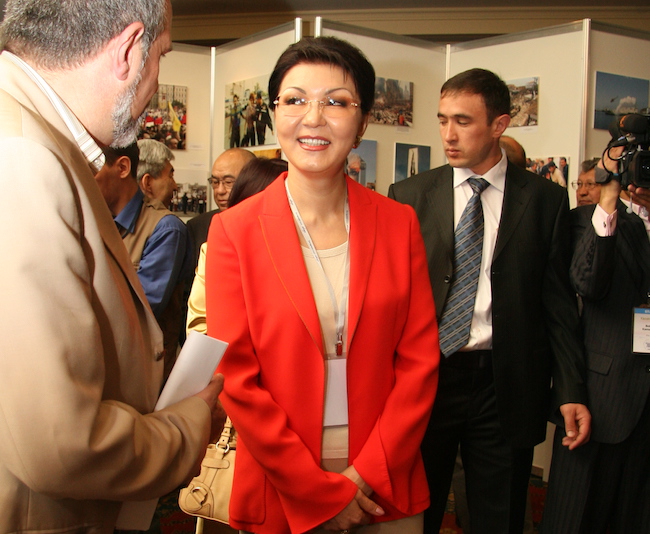On July 18, 2018, The Committee for Regulation of Natural Monopolies, Protection of Competition and Consumer Rights announced that the agency had finally completed the review of Kazakhtelecom’s request to purchase 75% of Kcell’s voting shares and made the expected decision to grant it.
Thus, the mystery that had lasted for half a year ended the way one should expect it to end in the country with the “super-presidential” state structure and the authoritarian political system.
The thing is that entrepreneur Alexander Klebanov is Kazakhtelecom’s minority shareholder. Through Sobrio Limited (Ras al-Khaimah, UAE), he controls 2672592 ordinary shares of the national company – 24% of the voting shares and 22.02% of the total number of shares. In reality, he is acting as a “front” for Dariga Nazarbayeva, President Nazarbayev’s eldest daughter.

Clearly, in the country where the key management decisions both political and economical are made in Akorda, Dariga Nazarbayeva had the undeniable advantage over her opponents both on the market and among the state authorities. It’s a different matter that the latter were still able to postpone the making of the final decision for as long as half a year and to stipulate a number of the conditions crucial for the other market players. Kazakhtelecom is to fulfill these conditions over a long period of time.
Here are some quotes from the press-release (text in bold by kz.expert).
“Among these conditions – keeping the current tariff plans (packages) for the duration of three years upon the completion of the deal; offering additional client services; widening the 4G network coverage in rural areas (with population of 4 thousand people and more) until 2021; introducing the standards of the 5G services no later than December 31, 2021.
Also, for the benefit of the consumers, the Anti-Monopoly Agency requires that Kazakhtelecom preserves the brands Kcell – Activ.
To operate independently, Kcell is to be managed separately, in other words, the shareholder will not be able to determine the directions in which the new Kcell management will operate.
To preserve the proper service quality and prices, the company must keep the current agreements on the cooperative development of the infrastructure with the other participants of the mobile communications market”.
The Anti-Monopoly Committee’s approval of the deal means that yet another important sector of the Kazakhstan economy is de-facto being monopolized by one of the branches of Nursultan Nazarbayev’s family. Consider that Nurali Alaiyev, the eldest son of Dariga Nazarbayeva and deceased Rakhat Aliyev, already controls Transtelecom JSC.

Note that, in 2015, Nurali Aliyev bought 49% of Transtelecom from Kazakhstan Temir Zholy that is a part of the Samruk-Kazyna state holding. Later, in May 2018, he bought the additional 26% minus one share in his fiduciary’s name. As a result, he now controls 75% minus one share of the county’s fifths mobile communications company in terms of the revenue size.
For the past half a year, many have been saying that the market monopolization is becoming unavoidable. With that, both the opponents and the supporters of the deal have been assessing its outcomes only from the standpoint of the economic efficiency, the influence of the mobile communications market, and the prospects of the sectoral development. In the meantime, something else is important here – the fact that the Kazakhstan ruling elite, first of all, the closest relatives and allies of Nursultan Nazarbayev, is becoming increasingly dominant in the country’s economy.
We believe this is happening not only due to the subjective reason both of the economic (for instance, the quite understandable desire to propel the business and increase the profit) and of the political nature (for instance, the unwillingness to take risks investing outside of the country) but also because of the objective necessity.
Unfortunately for Akorda, the national economy’s growth rates are significantly lower than those of the key elite groups’ fortunes which means that the share of the latter, on the markets where they operate, is becoming increasingly larger and more noticeable. In our opinion, this development is practically unavoidable since, in the context of the semi-market economy, the “super-presidential” state structure, and the authoritarian political system, all the known monopoly-resistance mechanisms are blocked or even non-existent.
Thus, handing the control over the Kazakhstan mobile communications market to Dariga Nazatbayeva and creating the implicit monopoly is the repetition of what has already happened -
- on the oil market that, for a number of years, has been operating under the unofficial supervision of Timur Kulibayev, the husband of Nursultan Nazarbayev’s second daughter Dinara Kulibayeva;
- in the banking sector with the dominant Halyk Bank that belongs to the same persons;
- in the metal industry, particularly ERG, KAZ Minerals, Kazzink, etc., that are under the control of oligarch Bulat Utemuratov who represents the interests of the President himself.
Note that here we have a clear consistent pattern – in the sectors that have to do with the resource development, in other words, where the presence of the state is particularly high, the monopolization took place much earlier than in those where there initially was a kind of market environment. For example, in the banking sector and the communications market.
Therefore, the recent developments in Kazakhstan are quite consistent with the economic model first described by Vladimir Ulyanov-Lenin in the classical work “Imperialism, the Highest Stage of Capitalism”. Note that the author characterizes it as the state-monopoly capitalism at the stage of imperialism.




